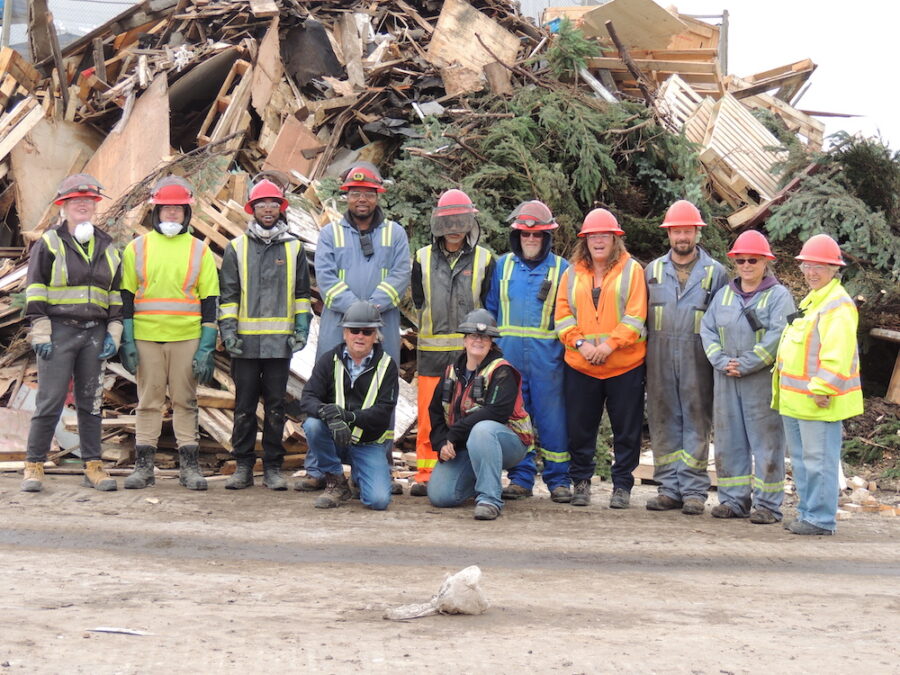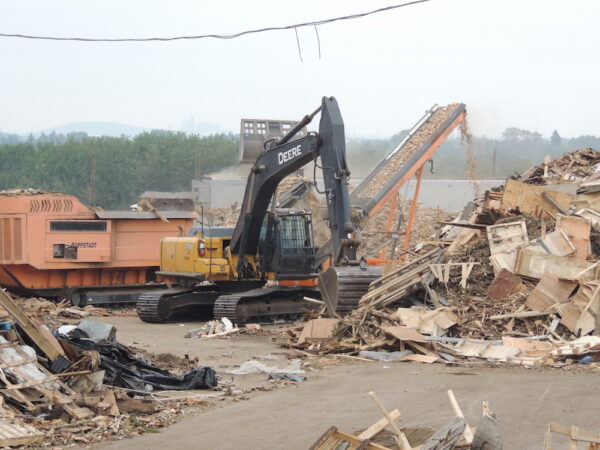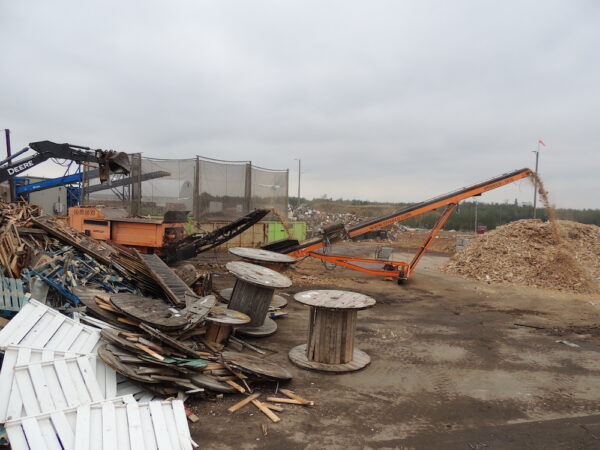
Fuelling recycling: Bio Fuels Inc. makes better use of landfill-destined wood products
July 24, 2023
By
Maria Church
 Most Bio Fuel Inc. employees have been with the company for seven or more years. Photo: Bio Fuels Inc.
Most Bio Fuel Inc. employees have been with the company for seven or more years. Photo: Bio Fuels Inc. Brian Perrault, general manager of Bio Fuels Inc. just west of Edmonton, says 15 years ago he was among the average Albertan tossing milk jugs and cartons in the trash.
In 2009, Alberta became the first in Canada to add refundable deposits to all milk containers – 10 cents a carton and 25 cents a jug. It wasn’t long before Perrault made the life-long switch to washing, flattening, and returning milk containers to his local recycling depot.
“It just makes sense. If I get paid, I’ll do it. It’s amazing what I’ll do for a quarter,” Perrault jokes with a laugh.
He shared this story to explain what he’d like to see happen with waste wood. To date, recycling wood from construction, demolition, and landscaping is entirely voluntary in Alberta. Most waste wood deposited at transfer stations or landfills ends up buried along with the rest of non-recyclable garbage.
Bio Fuels Inc. sits on a Class 3 landfill and transfer station and offers tipping-fee discounts to encourage waste wood recycling. The company sorts, decontaminates, and processes the wood into hog that helps fuel the 18 MW Dapp Power plant in Westlock, Alta. Both Dapp Power and Bio Fuels Inc. are owned by New York-based Fortistar.
Perrault calls wood waste recycling the final step of the full circle of forestry. “It was a tree, and it became a 2×4 for building. Then it comes back to here, we clean them, grind them, and then it goes to our power plant. They generate power, and the ash that they create with the material is put on farmers’ fields for fertilizer. It goes right back to where it started,” he says.
Bio Fuels Inc.’s yard supervisor Michelle Perdicou says under the current, unregulated regime, convenience wins out for companies looking to get rid of their construction waste.
“That’s the main struggle we’re seeing. Everybody is into recycling but not necessarily wood,” she says.
Instead, companies like theirs rely on either incentivizing through modest tipping-fee discounts, which eat at their bottom line, or the good will of waste collection or construction companies who see value in going out of their way to recycle the wood.
In a perfect world for Bio Fuels Inc., waste wood would go the way of the milk jug.
Perrault says a provincially mandated deposit on wooden construction material, or a government program that removes the tipping fee entirely for wood dropped off at recycling facilities, would change the game for their industry.
“There would be such a volume, it would be incredible,” he says.

Bio Fuels Inc. runs a 2013 Doppstadt 3060 shredder to process a range of waste wood from construction and demolition projects. Photo: Bio Fuels Inc.
Recycling plant
The Bio Fuels Inc. facility accept wood waste mixes as low as 50-50 wood to garbage. Much of the sorting process is still manual, with heavy machinery picking through at the initial stages and a three- to five-person sorting station handling the smaller material.
“We take all the contaminates out of it: the drywall, construction waste, plastics, concrete, dirt, things like that, and make a cleaner product without those contaminants. And then we grind that up and ship it out to Dapp Power,” Perdicou explains.
The company specializes in recycling wooden spools, the large, steel-supported spools for cable or piping, and are the largest recycler in Canada of that product. They remove and recycle the steel and grind up the wood.
In the yard, a handful of excavators, loaders and skidsteers move material around from the sorting areas to the shredder and trailers. Their current roster includes a John Deere 544 and 644 loaders, 250 excavator and 320 skidsteer, Caterpillar 315 and 240 excavators, and a Hitachi 210 excavator.
The sorting station was added some years back and has significantly increased the functionality and speed of the manual process, Perrault says.
The star of the show is their 2013 Doppstadt 3060 shredder. The company has been running the same model of the German machine since 2010, upgrading to newer versions as needed, and Perdicou is quick to praise it. “It’s been a really good application for us,” she says.
Brandt Tractor is their dealer of choice for the heavy equipment, but they’re currently on the hunt for a new Doppstadt dealer to service their shredder.

The company is the largest recycler of industrial wooden spools in Canada. Photo: Bio Fuels Inc.
Long-term employees
Perrault, a 26-year employee of Bio Fuels Inc. and Dapp Power (under a few owners), is on his final year before a well-deserved retirement.
“When we first started, it was a lot of manual labour and the volumes were low. Ab
out 1,000 tonnes a month we would do. Over the years we’ve doubled that, and when there were highs we’d go as high as 3,000-5,000 tonnes a month,” Perrault says. “We’ve gotten better at sorting. The operators have gotten better. They’re able to pick it through quite a bit … it’s just more efficient.”
Perdicou started with Bio Fuels Inc. in 2008 and will be taking over as general manager when Perrault retires next May. “Brian took a chance on a few of us riffraffs and taught us all that he knows. We’ve tried to listen and learn,” she says. “His knowledge is not easily replaced. Realizing that is going to be a challenge. But he has trained us well.
“And we’ll at least give him a couple of months before we start bugging him,” she says with a laugh.
Employee retention is a strength for the company. Heavy equipment operator Amber Kidd is among the veterans, with 12 years in the yard. Annamarie Sommer and Garry Corkum both have nine years under their belt, while Raphael Luseluanzambi has eight and Kim Poss and Larry Crispin both have seven.
“On the sorting station is four-year veteran Malsi Neehahs, and our newest crew members are Casandra Stephen, Ethan Vredegoor and Johnson. F.,” Perrault says.
During slower seasons, Bio Fuels Inc. runs with nine or 10 employees. When things pick up in the summer, they employ 15 or more.
Industry swings
At full capacity, Bio Fuels Inc. could handle 6,000 tonnes a month. And if supply was steady, Perrault says, the company could easily scale up their equipment to handle higher volumes, including looking at automation options for the sorting station.
A recent slew of new transfer stations opening up in the greater Edmonton area has decentralized the players that traditionally partnered with Bio Fuels Inc. Without a national, provincial or regional policy requiring wood waste recycling, the new companies are under no obligation to recycle their wood and will instead bring it with their regular loads to the nearest landfill.
But both Perrault and Perdicou are optimistic things will change for the better as the public continues to value environmentally friendly practices.
“I can see good things coming,” Perrault says. “This is the way to do things, and it will grow. People have to get on board, and our government has to get on board. It’s expensive to do things this way, but it’s the right thing to do.”
Print this page